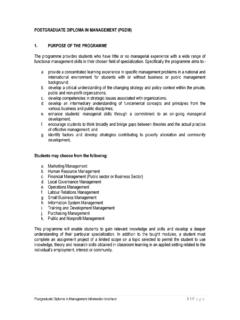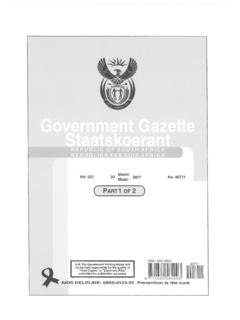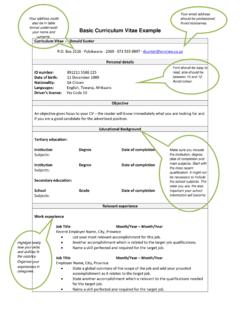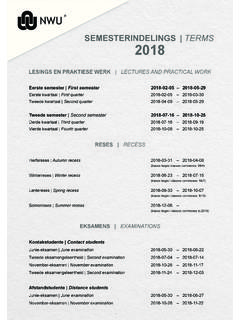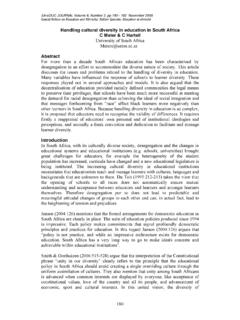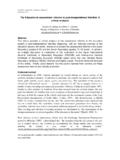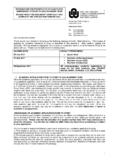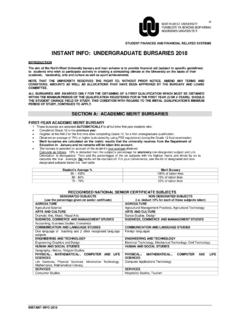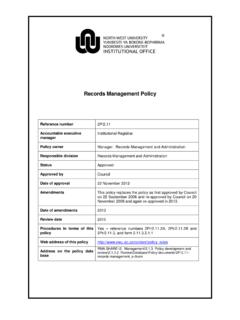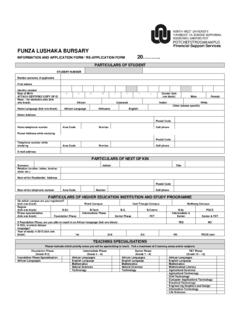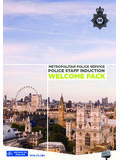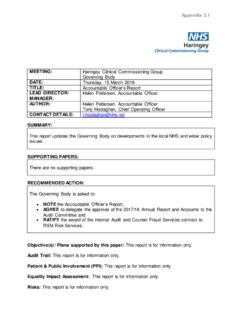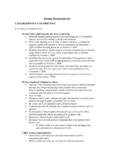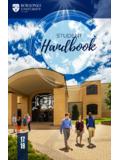Transcription of Social Media Policy - NWU
1 Social Media Policy Reference number 6 Accountable executive manager Executive Director: Marketing and Corporate Communication Policy owner Director: Communication Responsible division Communication Status Apporived Approved by North-West University Council Date of approval 17 November 2016 Amendments Date of amendments Review date 2019 Procedures in terms of this Policy Rules and Guidelines are attached to the Policy as an addendum Web address of this Policy Address on the Policy data base (10935746) H:\HSC\2. Management\ Policy management\Beleide\Raad November 2016\ Social Media Policy 1 Social Media Policy 1 Preamble As a pre-eminent university in Africa, driven by the pursuit of knowledge and innovation, with a unique institutional culture based upon the values the university espouses, the North-West University (hereinafter referred to as NWU) has adopted this Social Media Policy on 17 November 2016.
2 This Policy replaces any previous versions of a Social Media Policy or guidelines that may exist/have existed at any of the campuses of the NWU. 2 Policy statement It is in the best interest of the NWU to adhere to a Social Media Policy that supports the overall strategy of the university, as well as the current advancement goals of the institution, while simultaneously maintaining optimal relationships with Social Media users both in South Africa and internationally. Branding and promoting the public image of the institution facilitate the university s ability to be successful at its core business and such image is in turn directly impacted by what happens on Social Media hence, the rationale for overseeing the NWU s Social Media activities by means of this Policy . The overarching purpose of the Policy is to enhance the university s public image, in particular by guiding staff and students on best practices regarding the establishment and use of Social Media platforms.
3 The Policy is based on a number of fundamental principles, including: NWU values freedom of expression, a plurality of diverse views, academic freedom and critical thinking, but does not subscribe to any form or advocacy of discrimination on the basis of race, age, religion, gender, marital status, national origin, physical or mental disability, sexual orientation or other grounds as contained in the South African Constitution, or that which causes incitement to harm (such as hate speech ). The university encourages both transparent contact via Social Media by internal stakeholders and recognises Social Media to be an important role-player within an increasingly competitive Higher Education (HE) sector generally, and in influencing public attitudes towards and perceptions of the NWU, in particular. In an ever-changing, technology-driven and instant communication society, managing the flow of information and optimising Social Media conduct/exposure is becoming an increasingly important, but challenging aspect of advancing the university.
4 The NWU has a strong preference for honest, open communication that is timeous and accurate, as well as a definite leaning towards building irreproachable stakeholder relationships through rapid response rates and relevant feedback to questions or during discussions on Social Media platforms. The Policy does not derive from a frame of reference that is aimed at restricting the constitutional rights to freedom of expression/speech/association, but quite to the contrary, aims to facilitate the promotion and positioning of the NWU and its achievements in the public domain in a professionally accountable manner. However, all constitutional rights invoke corresponding responsibilities and hence internal role-players at the institution should realise their obligation for promoting the image/reputation of the NWU and that they will be held responsible for harming the good standing of the university by means of public commentary that might bring the university into disrepute.
5 The Policy promotes the dissemination of current, informative and engaging material that is presented in a consistent, accurate and professional manner during all forms of Social Media interaction. It also provides practical guidelines (please refer to the NWU Social Media Best Practices document, attached as an addendum to the Policy document) for managing the various aspects of conduct on Social Media . Social Media Policy 2 3 Scope of application This Policy applies to all operational units of the university including its staff and students at institutional, campus and faculty-based levels. For the sake of clarity, differentiation is made between official and unofficial (or private) conduct when interacting through Social Media by employees, temporary staff , students and contractors of the NWU: The Policy does not aim to constrain academic members of staff , researchers or discipline/topic-specific experts to hold or share any particular views/beliefs/thoughts/opinions, provided that the information that is provided to the public through Social Media does not undermine the professional trust relationship between the individual and his/her employer or breaches any confidentiality agreements that might harm the business and/or brand of the university.
6 Academic personnel are thus indeed encouraged to also freely comment on their respective fields of expertise and to share relevant information through relevant Social Media platforms. The Policy does not aim to regulate the private receiving or imparting of information by staff /students, except for in instances where such conduct directly harms the good standing of the employer (and which is regulated by the prevailing NWU Code of Conduct), or where the behaviour of the individual directly impacts the functioning and/or brand of the university negatively. The NWU endorses the concepts and practice of freedom of opinion/expression as essential to implementing the core business of the university including teaching, research and the pursuit of academic scholarship. This right does invoke the responsibility by staff and students to use these privileges in a manner that remains consistent with an accountable, honest search for knowledge and truth, grounded in scholarly evidence and taking cognisance of the university s vision, mission and values.
7 staff and students should take particular care in Social Media conduct to clarify that the information that is being disseminated or the response that they might be offering in reaction to an inquiry, is put forward in either their official capacity as an authorised representative/spokesperson of the university/a unit within the university; or that they are commenting in their role as a discipline-specific/academic expert on the topic at hand; or that they are acting in their personal capacity. Particularly in the instance of Social Media , these lines are easily blurred. While this is the NWU s Policy , it is also the responsibility of users of Social Media to adhere to the terms of use of the various individual platforms. The Policy explicitly does not apply to instances of protected disclosures (or whistle-blowing ), which is separately regulated by the relevant legislation on the topic in South Africa.
8 This Policy should be read together with other existing NWU policies. 4 Definitions Social Media is a broad term used to describe a host of web-based technologies and developments, and describes how modern Internet users typically consume as well as generate content. The following are examples of Social Media applications: Social networking sites: Facebook, Google Plus, CafeMom, Gather. Micro-blogging sites: Twitter, Tumblr, Snapchat, Posterous Publishing tools: WordPress, Blogger, Squarespace Collaboration tools: Wikipedia, WikiTravel, WikiBooks Rating/review sites: Amazon ratings, Angie s List Photo sharing sites: Flickr, Instagram, Video sharing sites: YouTube, Vimeo, Viddler, Vine Personal broadcasting tools: Blog Talk radio, Ustream, Livestream Virtual worlds: Second Life, World of Warcraft, Farmville Location-based services: Check-ins, Facebook Places, Foursquare, Yelp Widgets: profile badges, like buttons Social bookmarking and news aggregation: Digg, Delicious, Pinterest Group buying: Groupon, Living Social , Crowdsavings Electronic communication:, Blackberry Voice Call; Facebook Messenger, WhatsApp, Google Hangouts, MSN Messenger, chat rooms, email, etc.
9 Above examples may undergo name changes, or future developments could take its place Social Media Policy 3 5 Roles and responsibilities As a general principle, the relevant Social Media representatives are the first point of referral for all enquiries regarding a particular Social Media account. NWU staff is strongly advised to contact/refer questions to this person as a very first step, who will channel the request to the appropriate function/person and will also monitor that the matter receives the required attention. The roles and responsibilities of the various role-players are summarised as follows: Director: Communication Under the guidance of the Executive Director: Corporate Communication, the Director: Communication is responsible for implementing the NWU Social Media Policy . Responsible persons will identified and intervene if necessary when Social Media issues escalate beyond regular interaction to a point where brand/reputation damage could be likely.
10 Social Media Representatives Social Media representatives across the NWU maintain and monitor all relevant NWU accounts (a comprehensive online directory will be available on ) Academia All academic staff members and topic experts are encouraged to engage in public debate and to provide commentary within their area of expertise. Notwithstanding the right to express their academic views without restriction, it is strongly advised that experts who want to discuss controversial issues/findings/announcements (such that could generate robust debate or interaction) which may directly reflect on this university and wish to do so via Social Media , shall liaise, with the Director Communication first, in order to ensure effective coverage and to limit any possible negative publicity. staff and students staff or students who require a Social Media presence with regards to the NWU or affiliations of the NWU are requested to contact the Director: Communication to assist with best practices, and to approve branding and the use of corporate identity.
